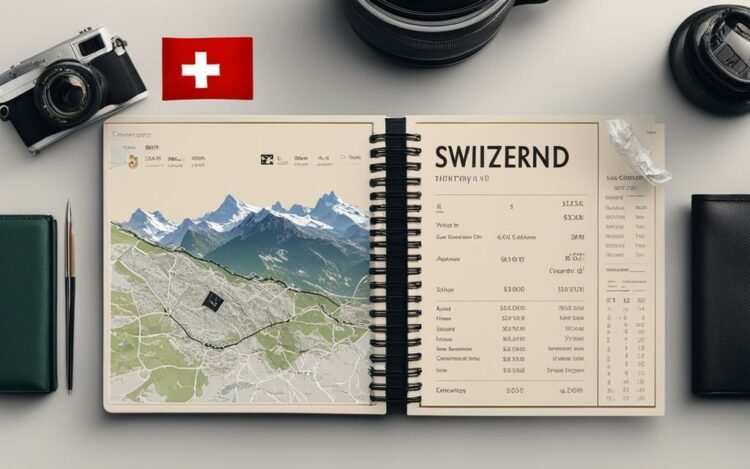Planning a trip to Switzerland? It’s essential to evaluate the cost of your 10-day adventure to ensure you have a realistic budget. With its breathtaking scenery and vibrant cities, Switzerland offers a multitude of experiences, but it’s important to understand the expenses involved.
In this article, we will analyze the travel expenses and provide a comprehensive budget breakdown for your 10-day trip to Switzerland. From accommodation and transportation to food and activities, we’ll help you plan your trip efficiently and economically.
Key Takeaways:
- Evaluating the cost of a 10-day trip to Switzerland is crucial for effective budget planning.
- Consider accommodation costs, transportation expenses, food and dining options, activity fees, and miscellaneous expenses.
- Research different accommodation types, from luxury hotels to budget-friendly rentals.
- Explore various transportation options like flights, train travel, and the Swiss Travel Pass.
- Save money on food costs by self-catering and exploring local markets.
Evaluating Accommodation Costs
When planning your 10-day trip to Switzerland, one of the crucial factors to consider is the cost of accommodation. Switzerland offers a wide range of options, from luxurious hotels to budget-friendly lodging alternatives like Airbnb rentals.
Accommodation costs can vary significantly depending on the type of lodging you choose. If you prefer the comfort and convenience of hotels, there are several reputable establishments across Switzerland that cater to different budgets. Whether you’re looking for a cozy boutique hotel or a world-class luxury resort, you’ll find options that suit your needs.
If you’re traveling on a tighter budget, Airbnb is a popular choice for affordable accommodations in Switzerland. With a variety of options available, including shared rooms, private apartments, and even unique properties like mountain cabins, Airbnb offers a more cost-effective alternative to traditional hotels.
It’s important to consider both your budget and preferences when evaluating accommodation costs for your trip. While luxury hotels offer a range of amenities and services, they often come with a higher price tag. On the other hand, budget accommodations like Airbnb rentals can provide a more budget-friendly option without compromising on comfort and convenience.
Factors such as location, season, and availability can also impact accommodation costs. Popular tourist destinations and peak travel seasons tend to have higher prices, so it’s worth considering less touristy areas or visiting during the shoulder seasons to save on lodging expenses.
Key Points:
- Evaluating accommodation costs is an essential part of planning a 10-day trip to Switzerland.
- Switzerland offers a range of accommodation options, including luxury hotels and budget-friendly Airbnb rentals.
- Consider your budget, preferences, and the factors impacting costs, such as location and season.
- Choosing a suitable accommodation option will help you manage your lodging expenses while enjoying a comfortable stay in Switzerland.
Now, let’s move on to the next section and analyze the transportation expenses involved in your 10-day trip to Switzerland.
Analyzing Transportation Expenses
When planning a 10-day trip to Switzerland, it’s essential to consider the transportation expenses involved. Switzerland offers various modes of transportation to help you get around and explore the beautiful country. Whether you choose to fly, take trains, buses, or boats, or even rent a car, understanding the costs and options will help you make informed decisions.
Flights to Switzerland
For those traveling from overseas, flying to Switzerland is a convenient option. While flight costs can vary depending on your departure location and the time of year, it’s important to consider this expense when budgeting for your trip. Researching and comparing different airlines and flight options can help you find the best deals and ensure a smooth journey.
Swiss Travel Pass
If you’re planning to use public transportation extensively during your 10-day trip, the Swiss Travel Pass can provide a cost-effective solution. This pass offers unlimited travel on the Swiss Travel System network, which includes trains, buses, and boats. Before purchasing the pass, compare the cost to the expenses of individual tickets for your planned journeys to determine which option is more economical for you.
Using public transportation is not only convenient but also allows you to enjoy the scenic beauty of Switzerland while minimizing transportation costs.
Renting a Car
If you prefer the flexibility and convenience of having your own transportation, renting a car is another option to consider. Renting a car in Switzerland allows you to explore remote areas and have more control over your itinerary. However, it’s important to factor in additional expenses such as fuel, parking fees, and tolls when calculating the overall cost. Additionally, be aware of any specific driving regulations in Switzerland and ensure you have the necessary documents and insurance coverage.

Public Transportation Within Cities
Switzerland has an extensive and efficient public transportation system within major cities and towns. This includes trams, buses, and trains, which are reliable and relatively inexpensive. Utilizing public transportation within cities can help you save on transportation costs while conveniently accessing popular tourist attractions and landmarks.
When evaluating transportation expenses for your 10-day trip to Switzerland, consider your preferences, budget, and itinerary. Choose the mode of transportation that suits your needs while keeping in mind the associated costs. By planning ahead and understanding your options, you can make the most of your trip while managing your transportation expenses.
Budgeting for Food and Dining
Switzerland is known for its delicious cuisine, offering a wide range of culinary delights. However, dining out in Switzerland can be quite expensive, making it essential to budget wisely for food costs during your 10-day trip. By adopting a strategic approach to dining, you can savor Swiss cuisine without breaking the bank.
1. Mix Dining Out and Self-Catering
An effective way to manage food expenses is to strike a balance between dining out and self-catering. While exploring Switzerland’s charming restaurants is a must, preparing your meals can be a cost-effective alternative. Consider booking accommodation with kitchen facilities to enjoy the freedom of cooking your own meals, allowing you to control your budget and experiment with Swiss recipes.
2. Grocery Shopping for Budget Meals
When it comes to grocery shopping, Switzerland offers a wide variety of options, including local supermarkets and specialty stores. Take advantage of these options to purchase ingredients for DIY meals, snacks, and packed lunches. This approach not only helps save money on food costs but also provides an opportunity to experience local Swiss ingredients and flavors.
3. Explore Local Markets and Street Food
Another way to experience the delectable Swiss cuisine without overspending is by exploring local markets and trying street food. Local markets are an excellent source for fresh produce, local delicacies, and regional specialties. Grabbing a quick meal from food stalls or street vendors can offer an authentic taste of Swiss cuisine at a fraction of the cost of fine dining.
By budgeting strategically for food and dining during your 10-day trip to Switzerland, you can relish the flavors of Swiss cuisine while keeping your expenses in check. Mixing dining out with self-catering, grocery shopping for budget meals, and exploring local markets and street food will not only help you save money but also enhance your culinary experience in Switzerland.
Estimating Activity Expenses
Switzerland offers a wide range of activities and attractions, making it a paradise for sightseeing and outdoor enthusiasts. Whether you’re seeking breathtaking hikes in the Alps or immersing yourself in the country’s rich cultural heritage through museum visits and historical sites, Switzerland has something for everyone.
When planning your 10-day trip, it’s important to consider the costs associated with these activities. Entrance fees to museums, guided tours, and additional expenses such as equipment rentals or transportation to remote areas should be taken into account.
By budgeting for activities in advance, you can determine how much you need to set aside for these experiences. Researching activity costs and exploring any available discounts or package deals can help you save money while still enjoying the best that Switzerland has to offer.
Hiking in the Swiss Alps
If you’re an outdoor enthusiast, hiking in the Swiss Alps is a must-do activity. With its stunning landscapes and well-maintained trails, Switzerland offers endless opportunities for memorable hikes. Some popular hiking destinations include the Jungfrau Region, Zermatt, and the Bernese Oberland.
While hiking in the Alps is generally free, keep in mind that there may be costs associated with transport to the starting point of the hike or cable car rides to reach higher altitudes. Additionally, renting hiking equipment or hiring a guide for more challenging routes may incur additional expenses.
Exploring Cultural Attractions
Switzerland’s rich cultural heritage can be experienced through its numerous museums, castles, and historical sites. From the historic Old Towns of Bern and Geneva to iconic landmarks like Chillon Castle and the Lavaux Vineyards, there’s no shortage of cultural attractions to explore.
Entrance fees to museums and attractions vary, so be sure to check individual websites or tourist information centers for up-to-date pricing. Some locations may offer discounted rates for students, seniors, or families, so it’s worthwhile to inquire about any available discounts to optimize your budget.
Keep in mind that some cultural attractions may offer guided tours at an additional cost. These tours can provide valuable insights and a deeper understanding of the history and significance of the sites you’re visiting.

Outdoor Adventures and Sports
If you’re seeking an adrenaline rush, Switzerland’s outdoor activities won’t disappoint. From skiing and snowboarding in winter to white-water rafting and paragliding in summer, there’s no shortage of thrilling adventures to embark on.
Outdoor activity costs can vary significantly depending on the specific sport and the equipment required. Skiing in popular resorts like Verbier or Zermatt can be a splurge, while other activities like hiking, biking, or kayaking may require minimal expenses.
When planning for outdoor adventures, consider renting equipment rather than purchasing it, especially for activities that you don’t frequently participate in. This can help you save both money and luggage space.
Plan Your Activities and Budget Wisely
Prioritizing the activities you most want to experience during your 10-day trip to Switzerland will allow you to allocate your budget accordingly. Consider creating a list of must-visit attractions and estimating the costs associated with each activity.
By planning in advance and being mindful of activity costs, you can make the most of your trip without exceeding your budget. Remember to research any available discounts, inquire about package deals, and utilize local resources to optimize your activity expenses.
Calculating Miscellaneous Expenses
In addition to the major expenses, there are also miscellaneous costs to consider when evaluating the overall cost of a 10-day trip to Switzerland. These can include travel insurance, souvenirs, tips, and currency exchange fees. It’s important to factor in these additional expenses to get a comprehensive understanding of the total cost of your trip.
When planning your trip to Switzerland, don’t forget to consider the importance of travel insurance. While it may seem like an extra cost, travel insurance can protect you against unexpected events such as trip cancellations, medical emergencies, or lost luggage. It provides peace of mind and ensures that you are financially covered in case of any unforeseen circumstances.
Another factor to consider is souvenirs. Switzerland is famous for its quality craftsmanship, making it the perfect destination to pick up unique and memorable souvenirs. However, it’s essential to set a budget for souvenirs to avoid overspending. Consider purchasing souvenirs that are not only meaningful but also fit within your budget.
Tipping is customary in Switzerland, but the specific tipping practices may vary. In restaurants, it’s common to leave a 5-10% tip if the service was satisfactory. However, tipping is not mandatory, and the service charge is often included in the bill. It’s always a good idea to check if a service charge has already been added before deciding on the tip amount.
When it comes to currency exchange, it’s essential to plan in advance to avoid unnecessary fees. Consider exchanging a small amount of currency before your trip for immediate expenses. For the rest, use ATMs in Switzerland, which offer competitive exchange rates. Avoid exchanging currency at airports or tourist areas, as they often have higher fees and unfavorable rates.
By considering these miscellaneous expenses, you can have a more accurate estimation of the total cost of your 10-day trip to Switzerland. Planning ahead and budgeting for these additional costs will help you ensure a financially smooth and enjoyable travel experience.
Conclusion
Planning a 10-day trip to Switzerland requires careful budget planning and evaluation of expenses. By considering accommodation costs, transportation expenses, food and dining options, activity fees, and miscellaneous expenses, you can accurately estimate the overall cost of your trip. Taking the time to research and budget for each aspect of your trip will ensure a memorable and financially manageable experience in Switzerland.
Switzerland offers a diverse range of accommodations, from luxury hotels to budget-friendly Airbnb rentals. Be sure to consider your budget and preferences when evaluating accommodation costs. Transportation costs can vary depending on your preferred mode of travel, whether it’s by flight, using the Swiss Travel Pass, or renting a car. Don’t forget to factor in food and dining expenses, where you can save by mixing dining out and self-catering.
Considerations for activity expenses are crucial, as Switzerland offers a host of attractions and activities. Research the cost of entrance fees and guided tours in advance to plan your budget accordingly. Finally, don’t overlook miscellaneous expenses, such as travel insurance, souvenirs, tips, and currency exchange fees, as they can significantly impact your overall travel expenses.
By following these budget planning strategies and considering all aspects of your trip, you can confidently tackle the cost of your 10-day Switzerland adventure. Start planning, create a realistic budget, and embark on a memorable journey through the breathtaking landscapes of Switzerland without worrying about exceeding your financial limits.
FAQ
What factors should I consider when evaluating accommodation costs for a 10-day trip to Switzerland?
When evaluating accommodation costs in Switzerland, consider factors such as the type of accommodation (luxury hotel, budget-friendly Airbnb), location, season, availability, and your personal preferences.
What are the transportation options for getting around Switzerland during a 10-day trip?
Transportation options in Switzerland include flights, train travel, public transportation within cities, and renting a car. You can also consider purchasing a Swiss Travel Pass for unlimited travel on the Swiss Travel System network.
How can I save money on food costs during my 10-day trip to Switzerland?
To save money on food costs, consider a mix of dining out and self-catering. Grocery shopping and cooking your meals can be a cost-effective option. Exploring local markets and trying street food can also provide a taste of Swiss cuisine without breaking the bank.
What should I consider when budgeting for activities during my 10-day trip to Switzerland?
When budgeting for activities, consider the cost of entrance fees, guided tours, and any additional expenses associated with the activities you plan to do. Research the costs in advance to accurately estimate how much you’ll need to set aside for these experiences.
What miscellaneous expenses should I factor in when evaluating the overall cost of a 10-day trip to Switzerland?
Miscellaneous expenses can include travel insurance, souvenirs, tips, and currency exchange fees. It’s important to consider these additional costs to get a comprehensive understanding of the total cost of your trip.

